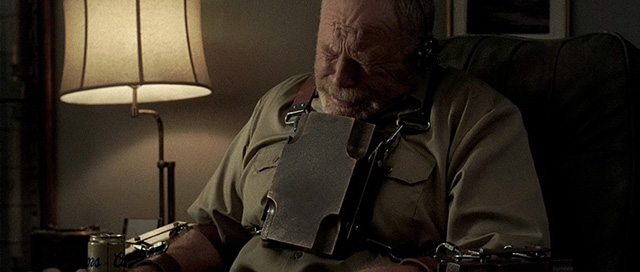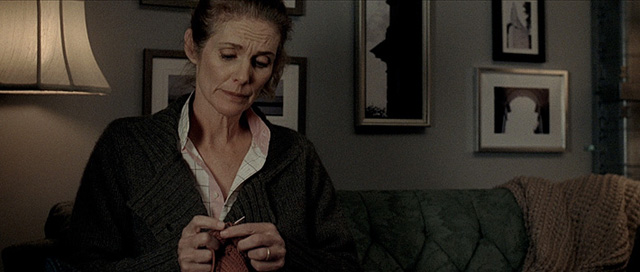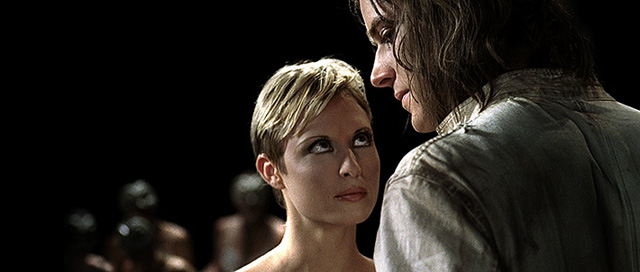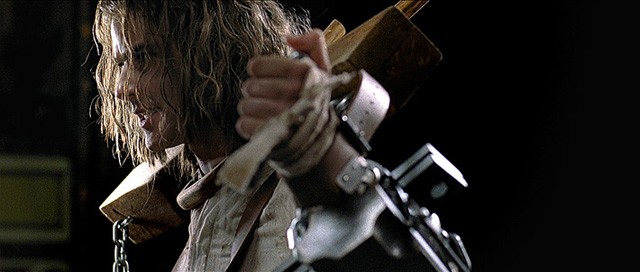Most people know Kurt Vonnegut Jr. for his novels, but I know him through one particular work of his short fiction: “Harrison Bergeron,” a look at a future when everyone is “finally equal.” I had adopted the text into my intro English courses upon consulting a list of student favorites: along with Kate Chopin’s “Story of an Hour” and John Updike’s “A & P” was “Harrison Bergeron.” I recognized Vonnegut’s name and the much-contested association that name has with science fiction. Is Vonnegut a literary writer, or SF? I like to think he’s both, despite some ivory towers refusing SF to the literary fold. Clearly, Dana Gioia and X.J. Kennedy, editors of Pearson Longman’s Literature: An Introduction to Fiction, Poetry, Drama, and Writing are in my camp, as in addition to “Bergeron,” they’ve anthologized Ursula K. Le Guin’s “The Ones Who Walk Away From Omelas,” another great work of dystopic short fiction.
Like “Omelas,” Vonnegut’s vision of a perfectly equal society doesn’t seem a dystopia at first. Many great dystopias seem like a good idea at first: as an adolescent, the high-sex low-clothing, youthful world of Logan’s Run was brilliant. As a forty year-old who’d already be dead ten years, it’s lost its glow. Vonnegut’s genius is that he not only provides a future premise we think will be fantastic, he writes in a persona that agrees with that premise. The narrative voice in “Harrison Bergeron” has bought in to the idea that being “equal every which way” is desirable. The only indication we have that Vonnegut isn’t serious about this in the opening lines is the disclaimer, “some things about living still weren’t quite right, though. April, for instance, still drove people crazy by not being springtime.” The joke may be lost on those closer to the equator, but to denizens of the Albertan prairies, this is a fine bit of ironic humour.
Vonnegut is surreptitiously winking at his reader, saying, “yes, I’m serious about what I’m saying. I’m just not saying it seriously.” His next wink will be his focalizing couple, George and Hazel Bergeron, a clever homage to George Burns and Gracie Allen: George Bergeron is very intelligent, while Hazel (the name of one of Gracie’s three sisters) evokes Gracie’s Dumb Dora act, clearest in the final lines of the short story:
“Gee—I could tell that one was a doozy,” said Hazel.
“You can say that again,” said George.
“Gee—” said Hazel, “I could tell that one was a doozy.”
Both Bergerons are seated in their living room, watching television: George with a “little mental handicap radio in his ear” to keep him from utilizing his exceptional intelligence, and Hazel without any handicap whatsoever, since she has “a perfectly average intelligence, which meant she couldn’t think about anything except in short bursts.” They are watching a ballet featuring dancers “burdened with sashweights and bags of birdshot,” their faces masked to hide their beauty. This is the price of a perfectly equal society, says Vonnegut with a satirical smile. Strong? We’ll give you burdens. Smart? We’ll give you headaches. Pretty? We’ll hide your face. Stupid? You’re perfect.

Vonnegut mixes this biting satire with hyperbolized action and elements of setting to underscore how ridiculous the whole idea is. When Harrison finally stomps into the story, his appearance is “Halloween and hardware”: a seven-foot teen encumbered by numerous handicaps:
The rest of Harrison’s appearance was Halloween and hardware. Nobody had ever born heavier handicaps … Instead of a little ear radio for a mental handicap, he wore a tremendous pair of earphones, and spectacles with thick wavy lenses. The spectacles were intended to make him not only half blind, but to give him whanging headaches besides.
Scrap metal was hung all over him. Ordinarily, there was a certain symmetry, a military neatness to the handicaps issued to strong people, but Harrison looked like a walking junkyard. In the race of life, Harrison carried three hundred pounds.
And to offset his good looks, the H-G men required that he wear at all times a red rubber ball for a nose, keep his eyebrows shaved off, and cover his even white teeth with black caps at snaggle-tooth random.
He takes over the television studio, proclaims himself the “Emperor,” orders the musicians to play well, and proceeds to dance with a “blindingly beautiful” ballerina, and while literally dancing on air, is shot dead by Diana Moon Glampers, the Handicapper General, in a manner worthy of Looney Tunes’ Elmer Fudd. Websites such as Suite 101, mistakenly overemphasize Harrison’s defiant action, painting him a revolutionary hero. This error stems from missing Vonnegut’s winks, his ironic tone, and ignoring the excessive exaggeration of the handicaps: “Vonnegut’s short story demonstrates the dangers of governmental control and ignorance through showing what a true equality could lead to.” But is Vonnegut actually issuing a warning of a potential future, or drawing our attention to how ludicrous the goal of true equality is? Other study guides list freedom and civil rights as major themes, and cast Vonnegut’s speculations in “Harrison Bergeron” as prognostication: we are closer now to the “reality” of “Harrison Bergeron” than ever before. We need to act like Harrison and rise up to cast off the handicaps that bring us down to the level of mediocrity…etc., etc.
But Vonnegut isn’t prognosticating: he’s satirizing. He isn’t saying, “This is how we might become if we aren’t careful.” He’s saying, “True equality isn’t possible. It’s a ridiculous aspiration. Here, let me show you just how ridiculous it is.” While “Harrison Bergeron” is certainly concerned with freedom, the idea of government control achieving the equal society Vonnegut imagines is absurd. Vonnegut knew as much, and reveals it in the line describing a ballerina:
She must have been extraordinarily beautiful, because the mask she wore was hideous. And it was easy to see that she was the strongest and most graceful of all the dancers, for her handicap bags were as big as those worn by two-hundred pound men.
Editors Gioia and Kennedy follow up the short story by asking how the following comment by two sympathetic critics of Vonnegut’s work, Karen and Charles Wood, applies to the story: “Vonnegut proves repeatedly … that men and women remain fundamentally the same, no matter what technology surrounds them.” Remember that the voice of the narrator is not against this equal society. The narrator never passes judgment on what is happening—it is impassive and remote. To observe the ballerina’s repulsive mask is an indicator of her extraordinary beauty is to admit the attempt at true equality has failed, and ultimately, cannot succeed. Think of how we adjust our concepts of beauty, if only in the waistline of women’s designer jeans: in the ‘80s, they were actually around the waist. Over the past quarter century, they’ve receded, heading farther and farther south until they’ve stopped only centimeters from scandal. One year, beauty is Twiggy, a decade later it’s Anna Nicole Smith. If ugly masks became the standard of beauty, we might actually get around to being turned on by them. Just consider current fetishes for comparison.
What many studies of “Harrison Bergeron” miss in their goal to make the story into Braveheart by Vonnegut, with a clown-nosed Harrison shouting “Freedom!” at the top of his lungs, is the simultaneous satire of television. Harrison’s actions all take place in a television studio. His parents, George and Hazel, see everything that happens: his entrance, his mini-revolution, and his death-by-double-barreled-shotgun. And yet, due to Hazel’s lack of intelligence, she can recall seeing “something real sad on television,” but cannot say what it was. George is so addled, he’s wandered out of the room in the middle of the studio takeover to get a beer. Many readers miss the mirror of Hazel’s earlier tears: “she’d forgotten for the moment what they were about.” Like Battlestar Galactica, Vonnegut seems to invoking the concept of eternal recurrence: “All of this has happened before, and it will all happen again.” This is a far more chilling concept than the society of true equality, that a mother could watch her son die on television, and summarily forget about it.

Director Chandler Tuttle grabs this theme and runs with it in 2081, an excellent short film adaptation of “Harrison Bergeron,” which, unlike the laughably bad television version starring Sean Astin, sticks close to Vonnegut’s story. The casting is brilliant, with the suitably taciturn and gravel-voiced James Cosmo as George, Julie Haggerty, the typecast bubblehead of the Airplane! series, as Hazel, and up-and-comer Armie Hammer as Harrison. It’s nearly note-for-note faithful, aside from leaving George to watch his son die while Hazel washes the dishes, and Hammer’s Harrison being anything but “clanking” and “clownish” (although at 6”5, he nearly pulls off the “huge”). One can forgive a director for choosing to leave Hammer’s eyebrows on, and eschew the inclusion of a clown nose for costume. Not everyone can pull off ridiculous like Tim Burton.
2081 mainly digresses from Vonnegut in the inclusion of a bomb threat made by Harrison. When I show the film in class, students are often non-plussed by the inclusion of the bomb, until we explore the reasons. I use the film as an exercise in how tone can change everything. Vonnegut is being satirical: no matter how dark his content may be, his tone is lightheartedly ironic. There is nothing wrong here, despite how those two people who were just dancing in the air are now dead on the floor. Tuttle is less subtle, but effective in his own right: his dystopia is dark, perhaps in response to film audiences raised on Blade Runner and Children of Men. Gone are the bags of birdshot to encumber the strong, replaced with high-tech sensor-driven weights that are constantly flickering levels, perhaps to compensate for fluctuations in strength. It doesn’t matter really, because all the handicaps are just backdrop: they’re setting. They are signifiers of oppression. The themes of freedom and civil rights are part of this backdrop. The world of 2081 is a totalitarian one, built on the aesthetic foundations laid by years of dystopias in SF film and television.
But it’s all still backdrop for Tuttle’s focus, that chilling law of eternal recurrence where we forget the atrocity on the six o’clock news in time to catch the latest reality show: “Yes, it’s awful what’s happening in Japan right now, but did you see the latest episode of Jersey Shore?” Harrison’s bomb is not incendiary: it’s informative. Like the videos and images that showed the world what was happening in Tibet in 2008, Harrison hacks the Matrix, uploads his pirate signal, and shows the world the truth about Diana Moon Glampers. In 2081, he becomes the revolutionary that students mistake him for in Vonnegut. Here, Harrison is a sort of Christ-figure who gives up his life willingly, knowing there is an small army of heavily armed police ready to shoot him dead. At one point, he whispers to the ballerina who agrees to join his dance, and I wonder if Tuttle’s direction was: “Tell her how this is going to end. Tell her, ‘We’re going to dance, and show the world what freedom looks like. And when we’re done, we’ll likely die.’” The ballerina’s knowing look following Harrison’s whisper conveys a conspiratorial understanding.

Despite presenting Harrison as revolutionary hero, Tuttle follows Vonnegut to the very bitter end. As in the short story, George cannot remember why tears stream down his face. He cannot tell Hazel their son was just shot on television. He can only stand to walk to the fridge for another beer. Despite a few narrative differences, Vonnegut and Tuttle deliver an indictment of our propensity to “forget sad things,” as Hazel and George respectively are encouraged to on the page, and onscreen, respectively. While the issue of true equality is a major theme of “Harrison Bergeron,” it is a ridiculous satire of an unattainable goal: Vonnegut highlights this through his use of ridiculous handicaps, and Tuttle reinforces the absurdity by their absence. It’s impossible to make a realistic-looking film with that sort of equality. But the criticism of our propensity in the current global village to witness atrocity on the television and forget about it during the commercial break is very real. We’ve all done it. We’ll likely do it again. “All of this has happened before, and it will all happen again.” After all, it’s only television. It’s only the internet. You’ll have forgotten all about this by the time the next commercial comes on, or … hey, I gotta go. Something’s trending on Twitter.
Mike Perschon is a hypercreative scholar, musician, writer, and artist, a doctoral student at the University of Alberta, and on the English faculty at Grant MacEwan University.










